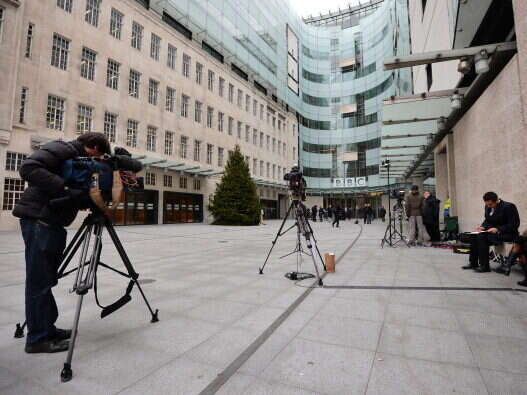
A BBC-commissioned review of the broadcaster’s economic impartiality has concluded “too many journalists lack understanding of basic economics”.
The review, undertaken by journalist Michael Blastland and economist Andrew Dilnot, said there was “plenty to applaud” in BBC coverage of tax and spending.
But it said risks to impartiality arose from the presentation of a narrow range of views and the failure to present uncertainty and trade-offs in policy decisions.
However, they said, many of their critiques “could apply at least equally to other UK media”.
The review was originally commissioned in March 2022 at the instruction of the BBC Board.
A group of economists had written to the corporation to complain that certain aspects of BBC economics reporting – in particular, the use of household analogies when explaining debt and spending – was “inappropriate”.
For their review Blastland and Dilnot interviewed BBC staff and outsiders and commissioned Jigsaw Research to carry out audience research.
The authors wrote that they found “widespread appreciation for BBC coverage of tax, public spending, government borrowing and debt, and plenty to applaud”.
But, they said, there were “gaps and assumptions” in the reporting that “put impartiality at risk”.
The pair wrote: “We think too many journalists lack understanding of basic economics or lack confidence reporting it,” in particular in their coverage of debt.
“Some journalists seem to feel instinctively that debt is bad, full stop, and don’t appear to realise this can be contested and contestable.”
Dilnot and Blastland said that the BBC’s economics coverage sometimes failed to emphasise that cuts were political decisions that entailed trade-offs.
“We think the root of this is not bias but insufficient awareness of the choices and debates here. Bluntly, debt is controversial. In the period we studied, too many BBC journalists appear not to have known how [controversial]…
“Too often, it’s not clear from a report that fiscal policy decisions are also political choices; they’re not inevitable, it’s just that governments like to present them that way. The language of necessity takes subtle forms; if the BBC adopts it, it can sound perilously close to policy endorsement.”
The authors cited as an example one instance in which a BBC journalist had said the government “will have to” take a course of economic action.
“We appreciate this was made live and might have been unintended. Still, BBC journalists should exercise extreme caution before suggesting a government ‘will have to…’ raise taxes, cut taxes, cut spending, raise spending, cut debt, raise debt, etc. – in any area. These are choices.”
Dilnot and Blastland also drew attention to whose interests are left out of current coverage: “Broad interests that lack political salience can be neglected. The taxpaying interests of people on low incomes and whole areas of the UK where incomes tend to be low are a striking example of this neglect. We think it fails the test of broad impartiality.”
[Read more: BBC wants 25% of staff to be from ‘lower socio-economic’ backgrounds by 2027]
The authors noted, for example, that in many parts of the UK outside London people pay more in VAT than they do in income tax, but the level of VAT tends to receive far less coverage on BBC News than income tax.
One other issue identified by the pair did not have a clear answer: “We were disturbed by how many people said they didn’t understand the coverage. In our audience research, most had no comment about impartiality on fiscal policy because they didn’t know what the stories meant.”
Blastland and Dilnot argued that “impartiality between the interests of different groups should include how accessible they find the coverage…
“The BBC excels at finding new, engaging ways of covering old subjects once thought dull, niche, or inaccessible, so it shouldn’t be beyond the bounds in this case.”
The BBC Board responded to the review saying it had asked director-general Tim Davie to draw up an action plan to address the issues identified.
Carys Roberts, the executive director of the Progressive Policy Think Tank which organised the letter that triggered the review, welcomed its findings.
“The BBC’s upcoming action plan must prioritise a more diverse set of credible economic perspectives in its coverage, ensuring that those reporting on the issues have a good understanding of them, as well as considered use of language to describe and explain economic events.
“Only by doing so will the BBC be able to perform its function of aiding public understanding and holding politicians to account.”
Email pged@pressgazette.co.uk to point out mistakes, provide story tips or send in a letter for publication on our "Letters Page" blog
